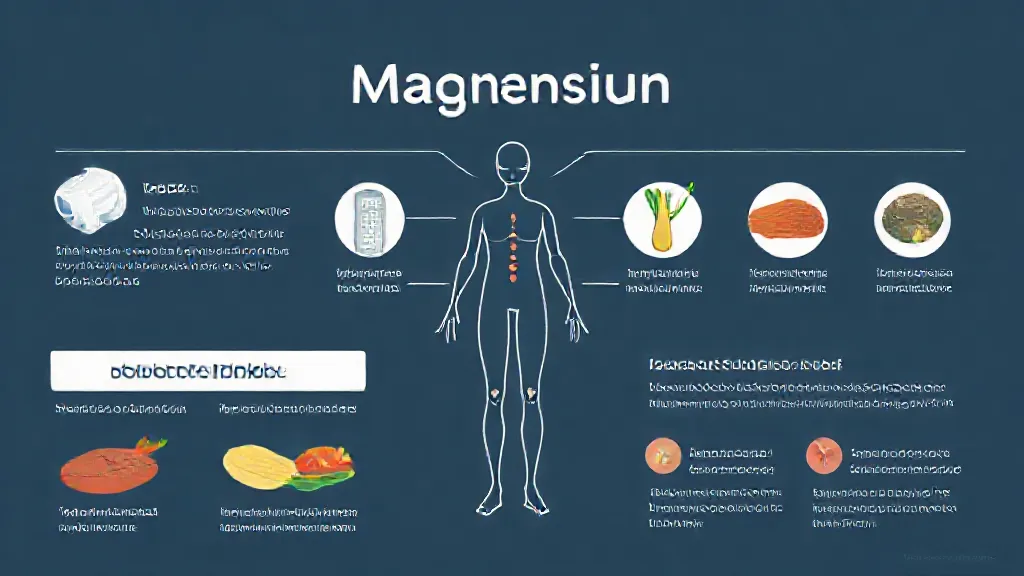Magnesium is a vital mineral that plays a crucial role in numerous bodily functions, including muscle and nerve function, blood glucose control, and blood pressure regulation. When the body lacks sufficient magnesium, it can lead to a variety of health issues that can affect overall well-being. This article delves into the consequences of magnesium deficiency, its symptoms, causes, and ways to ensure adequate intake.
The Role of Magnesium in the Body
Magnesium is involved in over 300 biochemical reactions in the body. It helps convert food into energy, supports muscle contraction, and is needed for the synthesis of DNA and RNA. Additionally, magnesium contributes to the structural development of bones and teeth.
Given its extensive role, a deficiency can disrupt these vital processes, leading to a cascade of health problems.
Symptoms of Magnesium Deficiency
The symptoms of magnesium deficiency can be subtle and often go unnoticed until they become more severe. Early signs include muscle cramps, fatigue, and irritability.
As the deficiency progresses, individuals may experience more severe symptoms such as numbness, tingling, and abnormal heart rhythms. Chronic magnesium deficiency can also lead to osteoporosis, anxiety, and migraines, showcasing its importance in both physical and mental health.
Causes of Magnesium Deficiency
Several factors can contribute to magnesium deficiency.
Inadequate dietary intake is a primary cause, often seen in individuals with poor nutrition or restrictive diets. Certain medical conditions, such as gastrointestinal diseases, diabetes, and chronic alcoholism, can impair magnesium absorption or increase its excretion. Additionally, the consumption of certain medications, like diuretics, can also lead to a decrease in magnesium levels.
Health Risks Associated with Low Magnesium Levels
Low magnesium levels have been linked to various health risks, including cardiovascular disease, hypertension, and type 2 diabetes. Research has shown that individuals with lower magnesium intake have a higher risk of developing heart disease. Furthermore, magnesium plays a role in insulin sensitivity; thus, a deficiency can contribute to insulin resistance, increasing the risk of diabetes.
Magnesium and Mental Health
Emerging studies indicate a strong connection between magnesium levels and mental health. Low magnesium has been associated with increased anxiety, depression, and mood disorders. This relationship may be due to magnesium’s role in neurotransmitter function and its ability to regulate stress hormones.
Ensuring adequate magnesium intake may help improve mood and overall mental well-being.
Sources of Magnesium
To prevent magnesium deficiency, it is essential to include magnesium-rich foods in your diet. Good sources of magnesium include leafy green vegetables, nuts, seeds, whole grains, and legumes.
Dark chocolate and avocados also provide significant amounts of magnesium. For those who struggle to get enough from food alone, magnesium supplements may be an option, but it is advisable to consult with a healthcare provider before starting any supplementation.
Testing for Magnesium Deficiency
Diagnosing magnesium deficiency can be challenging, as routine blood tests may not accurately reflect total body magnesium levels.
Doctors may assess symptoms and dietary intake, and in some cases, they may recommend a 24-hour urine test to measure magnesium excretion. If deficiency is confirmed, a targeted treatment plan can be developed, focusing on dietary changes and potential supplementation.
Conclusion: The Importance of Maintaining Adequate Magnesium Levels
In conclusion, magnesium is an essential mineral that supports numerous bodily functions.
Its deficiency can lead to a wide range of health issues, from muscle cramps to serious cardiovascular problems. Understanding the importance of magnesium and ensuring adequate intake through diet or supplementation is crucial for maintaining overall health and well-being.
